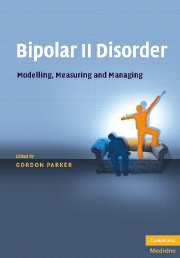Book contents
- Frontmatter
- Contents
- List of contributors
- Preface
- Introduction
- 1 Bipolar disorder in historical perspective
- 2 The bipolar spectrum
- 3 Defining and measuring Bipolar II Disorder
- 4 Bipolar II Disorder in context: epidemiology, disability and economic burden
- 5 Is Bipolar II Disorder increasing in prevalence?
- 6 The neurobiology of Bipolar II Disorder
- 7 The role of antidepressants in managing Bipolar II Disorder
- 8 The use of SSRIs as mood stabilisers for Bipolar II Disorder
- 9 Mood stabilisers in the treatment of Bipolar II Disorder
- 10 The use of atypical antipsychotic drugs in Bipolar II Disorder
- 11 The role of fish oil in managing Bipolar II Disorder
- 12 The role of psychological interventions in managing Bipolar II Disorder
- 13 The role of wellbeing plans in managing Bipolar II Disorder
- 14 Survival strategies for managing and prospering with Bipolar II Disorder
- 15 A clinical model for managing Bipolar II Disorder
- 16 Management commentary
- 17 Management commentary
- 18 Management commentary
- 19 Management commentary
- 20 Management commentary
- 21 Management commentary
- 22 Management commentary
- 23 Management commentary
- 24 Management commentary
- 25 Management commentary
- 26 Management commentary: What would Hippocrates do?
- 27 Management commentary
- 28 Rounding up and tying down
- Appendix 1 Black Dog Institute Self-test for Bipolar Disorder: The Mood Swings Questionnaire
- Index
- References
15 - A clinical model for managing Bipolar II Disorder
Published online by Cambridge University Press: 13 August 2009
- Frontmatter
- Contents
- List of contributors
- Preface
- Introduction
- 1 Bipolar disorder in historical perspective
- 2 The bipolar spectrum
- 3 Defining and measuring Bipolar II Disorder
- 4 Bipolar II Disorder in context: epidemiology, disability and economic burden
- 5 Is Bipolar II Disorder increasing in prevalence?
- 6 The neurobiology of Bipolar II Disorder
- 7 The role of antidepressants in managing Bipolar II Disorder
- 8 The use of SSRIs as mood stabilisers for Bipolar II Disorder
- 9 Mood stabilisers in the treatment of Bipolar II Disorder
- 10 The use of atypical antipsychotic drugs in Bipolar II Disorder
- 11 The role of fish oil in managing Bipolar II Disorder
- 12 The role of psychological interventions in managing Bipolar II Disorder
- 13 The role of wellbeing plans in managing Bipolar II Disorder
- 14 Survival strategies for managing and prospering with Bipolar II Disorder
- 15 A clinical model for managing Bipolar II Disorder
- 16 Management commentary
- 17 Management commentary
- 18 Management commentary
- 19 Management commentary
- 20 Management commentary
- 21 Management commentary
- 22 Management commentary
- 23 Management commentary
- 24 Management commentary
- 25 Management commentary
- 26 Management commentary: What would Hippocrates do?
- 27 Management commentary
- 28 Rounding up and tying down
- Appendix 1 Black Dog Institute Self-test for Bipolar Disorder: The Mood Swings Questionnaire
- Index
- References
Summary
Introduction
As stated earlier in several sections of this book, we currently lack an evidence base for knowing how best to manage Bipolar II Disorder (BP II). We can presume, however, that three modalities (i.e. psychotropic drugs, information and education, wellbeing plans) that have been demonstrated as effective and beneficial for the management of Bipolar I Disorder (BP I) have similar broad relevance. The roles and effectiveness of specific drug classes (i.e. antidepressants, antipsychotics and mood stabilisers) remain unclear, however, and as noted in many of the earlier chapters, it may be erroneous to extrapolate decision rules for psychotropic drugs from guidelines derived for managing BP I Disorder. In the absence of randomised controlled studies, we are left with either opinion or clinical observation – a strategy risking idiosyncratic views. In this chapter, my personal approaches are detailed to lay down a template for consideration. To address concerns about any idiosyncrasies, the views of a number of internationally respected experts are provided as commentaries – either in relation to the template or their independent management observations. As Ghaemi (Chapter 26), quoting Peirce, so percipiently notes, ‘Scientific truth is not the purview of any individual but rather flows from the consensus of the community of investigators: we are all in this together’.
Providing a diagnosis and introducing a management plan
While the impact of receiving a diagnosis of bipolar disorder can range from relief to profound distress, most people appreciate a firm diagnosis, particularly if they have had their mood swings misconstrued, misdiagnosed or minimised by others.
- Type
- Chapter
- Information
- Bipolar II DisorderModelling, Measuring and Managing, pp. 204 - 216Publisher: Cambridge University PressPrint publication year: 2008



